BeeGuards on Two Bees in a Podcast
BeeGuards presented at the famous US Bee Podcast by our Cecilia Costa on the podcast: Two Bees in a Podcast produced by the University of Florida. Episode 194. 11th February 2025.
BeeGuards aims to strengthen the resilience of the European beekeeping sector and beyond by providing sustainable management practices, novel breeding strategies and by developing analytic and digital forecasting tools to enable the sector to adapt to a changing environment.
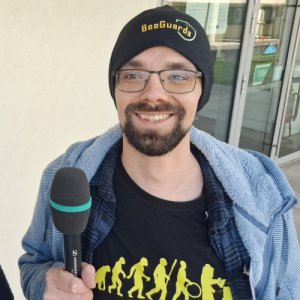
Monday Mar 24, 2025
Monday Mar 24, 2025
Whoopie 9 and 1. Update on the planning and interaction with the beekeeping stakeholders to produce an interactive WikiBEEdia and how it is to be a test apiary running the innovative varroa management.
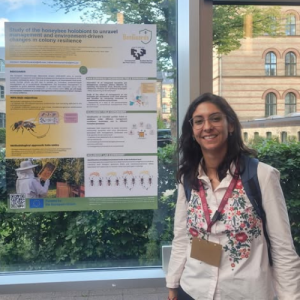
Wednesday Mar 12, 2025
Wednesday Mar 12, 2025
Whoopie 4. Holobiont. Get insight into the secrets of the holobionts by Melanie Parejo from the University of the Basque Country (UPV/EHU). Whoopie 4 will provide a handbook for standard methods in bee hologenomic research, integrate differ “-omic” methods in field and laboratory exp0eriments and determine the specific genetic and microbial combinations that foster honeybee resilience under the innovative management concept.

Tuesday Mar 04, 2025
Tuesday Mar 04, 2025
Cozy conversation with Dylan Elen, about the innovative varroa treatment but also the importance to conserve the subspecies of Apis mellifera. The conversation comes close to activities within the BeeGuards and what is the aim of the Dark Bee association. ZwarteBij.org is already running several breeding programs. Operating multiple mating stations. They offer courses on beekeeping, breeding, ...
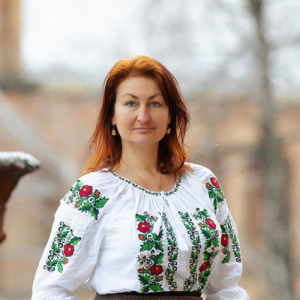
Monday Feb 24, 2025
Monday Feb 24, 2025
BeeGuards aim is to strengthen the resilience of beekeeping beyond our project partners. Flemming Vejsnæs, did meet Maria Fedoriak who is one of our MAF members (member of our multi actor forum) in Padova telling us about the beekeeping situation in Ukraine at the moment. It is a long, important and very strong story. You need to listen!
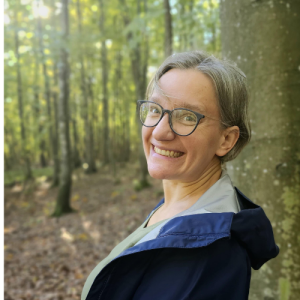
Thursday Feb 20, 2025
Thursday Feb 20, 2025
The Wilde family business, a well-known big queen breeder operation with focus on artificial insemination. In the BeeGuards project they the testing of innovative varroa management. The story of a family company and how to run the testing.
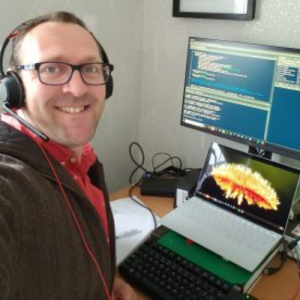
Thursday Feb 13, 2025
Thursday Feb 13, 2025
Giles Budge, Newcastle Upon Tyne. The Scientist behind BeeGuards. We are very curious, so we try to have conversations with our partners on what background and what else they are doing of scientific work.
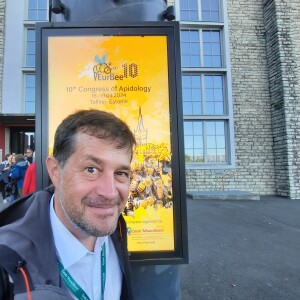
Sunday Feb 09, 2025
Sunday Feb 09, 2025
Whoopie 3. Monitoring & Modeling. Janez Presern from Agricultural Institute of Slovenija talking about that WP3 serves as an integration hub for the data we collect. What do we collect? We have established an Europe-wide network of colonies established with various sensors to monitor the colony’s development and associate it with environment. We augment these data with data of external providers, such as weather services to develop a decision support system to assist beekeepers.
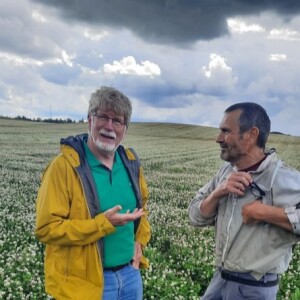
Wednesday Dec 04, 2024
Wednesday Dec 04, 2024
Apimondia is one of our partners in BeeGuards. The president of Apimondia Jeff Pettis takes us in the world of Apimondia. Apimondia is the International Federation of Beekeepers’ Associations. It represents the interests of apiculture worldwide (122 Member Associations from 73 countries). It facilitates links between beekeepers, scientists and all those involved in beekeeping and represents apiculture at international level to many bodies, for example GATT, the Food and Agriculture Organization of the UN (FAO), consumer and agricultural interests. Apimondia is also active in boosting the quality of honey (fight against honey fraud) and natural beekeeping.

Sunday Nov 17, 2024
Sunday Nov 17, 2024
Today we present ELGO ‘DIMITRA’ from Greece, one more of our partners. Fani Hajina presents a very exciting institute. Ellinikos Georgikos Organismos DIMITRA is a research organization under the auspices of the Ministry of Rural Development and Food in Greece, and it is devoted to agricultural research, education and product quality control. The Department of Apiculture (Institute of Animal Science) is undertaken research on topics like bee disease control with organic methods, bee breeding and conservation, and the effects of pesticides. In our team, apart from the Bee Experts (Fani & Leonidas), we also have members from other departments/ Institutes of ELGO ‘DIMITRA’ who have the expertise on pollination, animal genetics and animal reproduction & cryopreservation.
Ps. Hope you can see the bee on Fani's new jacket.
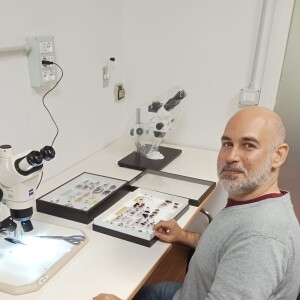
Monday Nov 04, 2024
Monday Nov 04, 2024
BeeGuards "WP8 - Analysis of plant-pollinator-pathogen networks to assess the impact of beekeeping on wild pollinators" aims to evaluate how beekeeping affects wild pollinators across agricultural landscapes and to identify management strategies that can reduce potential competition. We will perform field and laboratory experiments, as well as analysis of historical data on honey bee density and wild pollinator abundance and diversity. Additionally, we will engage beekeepers and the public in a citizen science initiative to contribute to the research and improving knowledge and awareness of on the important ecological role of wild pollinators.
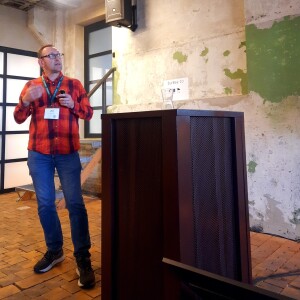
Wednesday Oct 30, 2024
Wednesday Oct 30, 2024
Listen our podcast: https://beeguards.podbean.com/e/giles-1/
Listen to Giles Budge, Newcastle University from the Whoopie 06- Parasites & Pathogens explaining this important task of the BeeGuards. Our overarching objective is to better understand how climate influences the emergence of pest and pathogen threats, so that beekeeping resilience can be improved by predicting emergence and developing management tools to mitigate threats. We will work on different aspects of mite (Varroa and Tropilaelaps) and small hive beetle control, and predict bacterial (American and European foulbrood), viral (Sacbrood, chronic bee paralysis) and Nosemosis emergence across Europe as we undergo climate change.

Thursday Oct 10, 2024
Thursday Oct 10, 2024
Whoopi 9. In this podcast we speak about an outcome of the BeeGuards project that is meant to stay. Robert Brodschneider from the University of Graz introduces us to WikiBeedia.eu. This is an online encyclopedia all about the honey bee, beekeeping and bee research. You can look up technical terms in many languages, as well as provide your own knowledge on beekeeping for others.
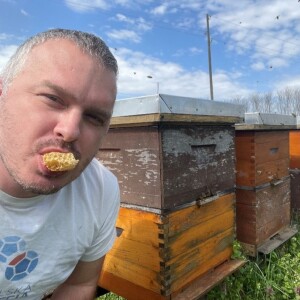
Monday Jul 08, 2024
Monday Jul 08, 2024
Become a part of the BeeGuards. Citizens Scientist – Beekeeping protocol
As a part of BeeGuards we invite all beekeepers to become a part of our exciting project, doing your share on comparing a new innovative varroa treatment strategi and you “normal” varroa strategi. Listen to Marin Kovačić from Croatia, presenting the Beekeepers Protocol. Putting light on what your involvement could bee in the future. Bee a part of a more sustainably beekeeping in the future. Have a listen!
Sign up here https://ec.europa.eu/eusurvey/runner/BeeGuardsCitizenScienceRegister
Download the Beekeepers Protocol here: https://beeguards.eu/downloads/

Monday Jul 01, 2024
Monday Jul 01, 2024
Good question! Listen to Raffaele explaining how you can bee involved, even become asked about your opinion. How you can influence such a big project. Our MAF group is with around 250 stakeholders. Feel free to join, sign up on this mail: maf@beeguards.eu
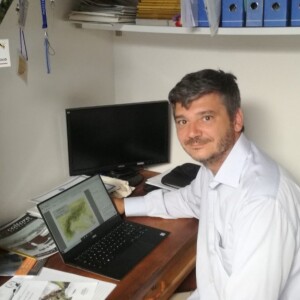
Thursday May 30, 2024
Thursday May 30, 2024
BeeGuards "WP2 - Innovative Breeding" is about to enter its pivotal phase for the current year, as the honey bee mating season is approaching in most European countries; in this episode, we will feature the interview with Raffaele Dall'Olio (BeeSources) who is running the study in Italy in collaboration with CREA. As Italy is the southernmost country involved in WP2, don't be surprised when Raffaele will tell you that both 'conventional' and 'innovative' mating stations are already open!
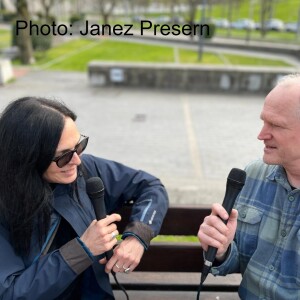
Thursday Mar 28, 2024
Thursday Mar 28, 2024
On a bench close to the Guggenheim Museum in Bilbao, we did meet the coordinator of the BeeGuards: Cecilia Costa. Simply question: What is BeeGuards about? Understand the project within 20 min.
BeeGuards presented at the famous US Bee Podcast by our Cecilia Costa on the podcast: Two Bees in a Podcast produced by the University of Florida. Episode 194. 11th February 2025.

The BeeGuards consortium comprises 27 partners from 15 countries, including universities, research institutes, IT companies, beekeeping companies, associations and advisors.
Through a multi actor approach and an open and inclusive design of the work program, the BeeGuards team embeds a wide and diversified range of stakeholders.
As a community during this 4-year project, we will perform an international field study evaluating and validating an innovative threshold-based management concept and an accelerated breeding strategy for resilience.
Complementary investigations will elucidate the ways in which management and climate act on honey bees and other pollinators.
Our open and participatory actions include the development of a long-term self-sustaining community tool: a WikiBEEdia website where we will share and promote innovative concepts and BeeGuards results, including a Quest for sustainable beekeeping practices.
BeeGuards will show how to protect pollinator biodiversity, to ensure the future provision of pollination services, preparing the European apicultural sector to meet the climate challenge.
Horizon Europe research and innovation programme Grant Agreement No. 101082073
“Views and opinions expressed are however those of the author(s) only and do not necessarily reflect those of the European Union or European Commission. Neither the European Union nor the granting authority can be held responsible for them.”